Boulders Beach is a sheltered beach made up of inlets between granite boulders, from which the name originated. It is located in the Cape Peninsula, near Simon's Town towards Cape Point, near Cape Town in the Western Cape province of South Africa. It is also commonly known as Boulders Bay. It is a popular tourist stop because of a colony of African Penguins which settled there in 1982. Boulders Beach forms part of the Table Mountain National Park.
Although set in the midst of a residential area, it is one of the few sites where this vulnerable bird (Spheniscus demersus) can be observed at close range, wandering freely in a protected natural environment. From just two breeding pairs in 1982, the penguin colony has grown to about 3,000 birds in recent years. This is partly due to the reduction in commercial pelagic trawling in False Bay, which has increased the supply of pilchards and anchovy, which form part of the penguins' diet.
Bordered mainly by indigenous bush above the high-water mark on the one side, and the clear water of False Bay on the other, the area comprises a number of small sheltered bays, partially enclosed by granite boulders that are 540 million years old.
The most popular recreational spot is Boulders Beach, but the penguins are best viewed from Foxy Beach, where newly constructed boardwalks take visitors to within a few meters of the birds. It is also a popular swimming beach, although people are restricted to beaches adjacent to the penguin colony.
Boulders Beach - Penguins, other birds etc.
- Lisbeth
- Site Admin
- Posts: 67398
- Joined: Sat May 19, 2012 12:31 pm
- Country: Switzerland
- Location: Lugano
- Contact:
Boulders Beach - Penguins, other birds etc.
"Education is the most powerful weapon which you can use to change the world." Nelson Mandela
The desire for equality must never exceed the demands of knowledge
The desire for equality must never exceed the demands of knowledge
- Lisbeth
- Site Admin
- Posts: 67398
- Joined: Sat May 19, 2012 12:31 pm
- Country: Switzerland
- Location: Lugano
- Contact:
Re: Boulders Beach - Penguins, other birds etc.
Obviously I was a bit behind, when I first arrived at Boulders beach, because I thought that you could "walk with the penguins". It was not so  Wooden walkways had been build all over and it was a bit of a disappointment, but I am sure that it is much safer for the birds' well being not to be disturbed by two-legs walking almost on top of them
Wooden walkways had been build all over and it was a bit of a disappointment, but I am sure that it is much safer for the birds' well being not to be disturbed by two-legs walking almost on top of them 
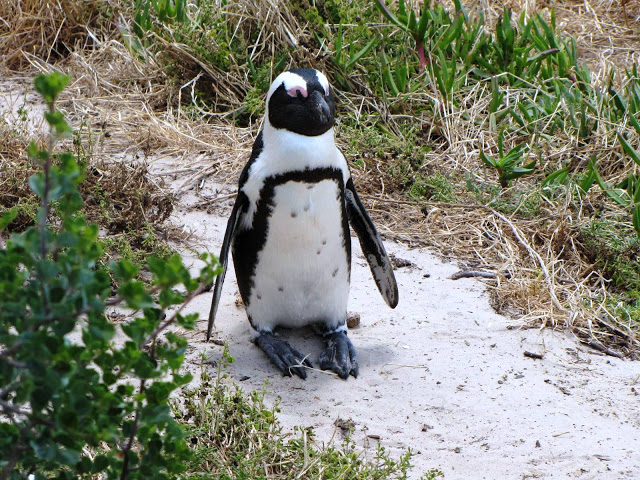
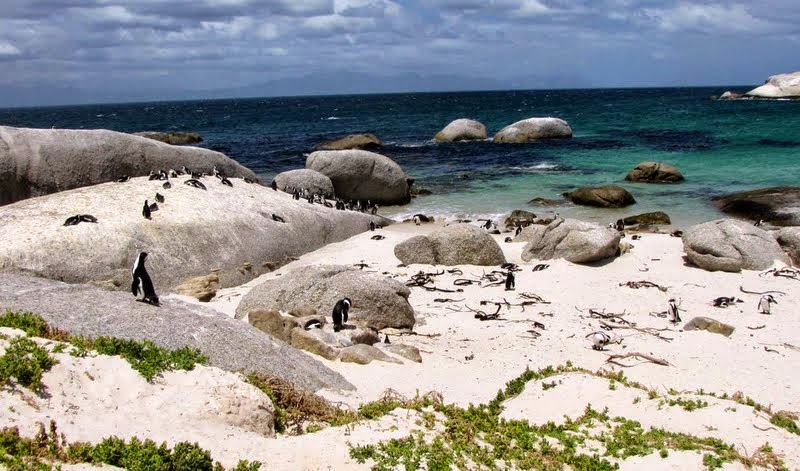


"Education is the most powerful weapon which you can use to change the world." Nelson Mandela
The desire for equality must never exceed the demands of knowledge
The desire for equality must never exceed the demands of knowledge
- Lisbeth
- Site Admin
- Posts: 67398
- Joined: Sat May 19, 2012 12:31 pm
- Country: Switzerland
- Location: Lugano
- Contact:
Re: Boulders Beach - Penguins, other birds etc.
The African penguin (Spheniscus demersus), also known as the jackass penguin and black-footed penguin is a species of penguin, confined to southern African waters. It is also widely known as the "jackass" penguin for its donkey-like bray, although several related species of South American penguins produce the same sound. Like all extant penguins it is flightless, with a streamlined body, and wings stiffened and flattened into flippers for a marine habitat. Adults weigh on average 2.2–3.5 kg (4.9–7.7 lb) and are 60–70 cm (24–28 in) tall. It has distinctive pink patches of skin above the eyes and a black facial mask; the body upper parts are black and sharply delineated from the white underparts, which are spotted and marked with a black band. This pink gland above their eyes helps them to cope with changing temperatures. When the temperature gets hotter, the body of the African penguin sends more blood to these glands to be cooled by the air surrounding it. This then causes the gland to turn a darker shade of pink.
The African penguin is a pursuit diver and feeds primarily on fish and squid. Once extremely numerous, the African penguin is declining due to a combination of threats and is classified as endangered. It is a charismatic species and is popular with tourists.
The African penguin is a pursuit diver and feeds primarily on fish and squid. Once extremely numerous, the African penguin is declining due to a combination of threats and is classified as endangered. It is a charismatic species and is popular with tourists.
"Education is the most powerful weapon which you can use to change the world." Nelson Mandela
The desire for equality must never exceed the demands of knowledge
The desire for equality must never exceed the demands of knowledge
- Lisbeth
- Site Admin
- Posts: 67398
- Joined: Sat May 19, 2012 12:31 pm
- Country: Switzerland
- Location: Lugano
- Contact:
Re: Boulders Beach - Penguins, other birds etc.
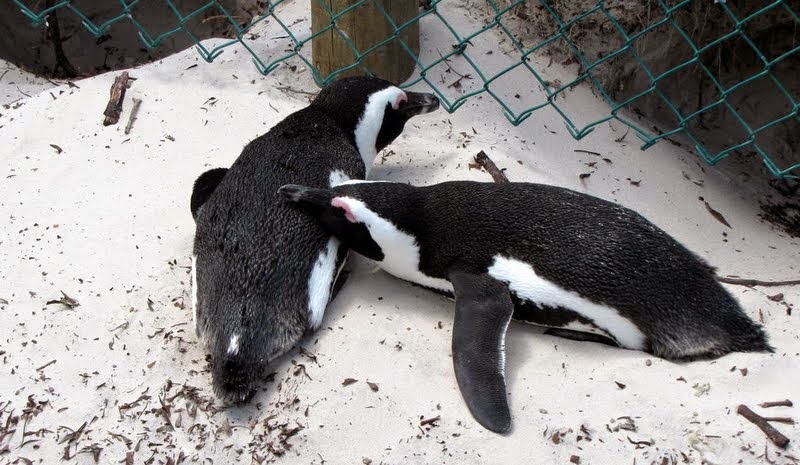
"Education is the most powerful weapon which you can use to change the world." Nelson Mandela
The desire for equality must never exceed the demands of knowledge
The desire for equality must never exceed the demands of knowledge
- Lisbeth
- Site Admin
- Posts: 67398
- Joined: Sat May 19, 2012 12:31 pm
- Country: Switzerland
- Location: Lugano
- Contact:
Re: Boulders Beach - Penguins, other birds etc.
African penguins grow to 60–70 cm (24–28 in) tall and weigh between 2.2–3.5 kg (4.9–7.7 lb).[5] They have a black stripe and black spots on the chest, the pattern of spots being unique for every penguin, like human fingerprints. They have pink glands above their eyes, which are used for thermoregulation. The hotter the penguin gets, the more blood is sent to these glands so it may be cooled by the surrounding air, thus making the glands more pink.[6] This species exhibits slight sexual dimorphism: the males are larger than the females and have larger beaks.[7] Juveniles do not possess the bold, delineated markings of the adult but instead have dark upperparts that vary from greyish-blue to brown; the pale underparts lack both spots and the band. The beak is more pointed than that of the Humboldt. Their distinctive black and white colouring is a vital form of camouflage called countershading– white for underwater predators looking upwards and black for predators looking down onto the dark water. African penguins look similar and are thought to be related to the Humboldt, Magellanic, and Galapagos penguins.[8] African penguins have a very recognizable appearance with a thick band of black that is in the shape of an upside-down horseshoe. They have black feet and unique black spots that vary in size and shape per penguin. Magellanic penguins share a similar characteristic that often confuses the two, the similarity is a double bar on the throat and chest. These penguins have the nickname of "jackass penguin" which comes from the loud noises they make.
"Education is the most powerful weapon which you can use to change the world." Nelson Mandela
The desire for equality must never exceed the demands of knowledge
The desire for equality must never exceed the demands of knowledge
- Lisbeth
- Site Admin
- Posts: 67398
- Joined: Sat May 19, 2012 12:31 pm
- Country: Switzerland
- Location: Lugano
- Contact:
Re: Boulders Beach - Penguins, other birds etc.
The African penguin is found on the south-western coast of Africa, living in colonies on 24 islands between Namibia and Algoa Bay, near Port Elizabeth, South African. It is the only penguin species that breeds in Africa and its presence gave name to the Penguin Islands.
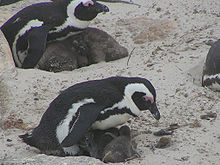
With chicks, Boulders Beach, South Africa
Two colonies were established by penguins in the 1980s on the mainland near Cape Town, namely Boulders Beach near Simon's Town and Stony Point in Betty's Bay. Mainland colonies probably only became possible in recent times due to the reduction of predator numbers, although the Betty's Bay colony has been attacked by leopards.[9] The only other mainland colony is in Namibia, but it is not known when it was established.
Boulders Beach is a tourist attraction, for the beach, swimming and the penguins.[10][11] The penguins will allow people to approach them as close as a metre.
There are also a few colonies spread throughout the world. However they are few and far between and are a very rare sight for those actively looking for them.

With chicks, Boulders Beach, South Africa
Two colonies were established by penguins in the 1980s on the mainland near Cape Town, namely Boulders Beach near Simon's Town and Stony Point in Betty's Bay. Mainland colonies probably only became possible in recent times due to the reduction of predator numbers, although the Betty's Bay colony has been attacked by leopards.[9] The only other mainland colony is in Namibia, but it is not known when it was established.
Boulders Beach is a tourist attraction, for the beach, swimming and the penguins.[10][11] The penguins will allow people to approach them as close as a metre.
There are also a few colonies spread throughout the world. However they are few and far between and are a very rare sight for those actively looking for them.
"Education is the most powerful weapon which you can use to change the world." Nelson Mandela
The desire for equality must never exceed the demands of knowledge
The desire for equality must never exceed the demands of knowledge
- Lisbeth
- Site Admin
- Posts: 67398
- Joined: Sat May 19, 2012 12:31 pm
- Country: Switzerland
- Location: Lugano
- Contact:
Re: Boulders Beach - Penguins, other birds etc.
Population
Roughly 4 million penguins existed at the beginning of the 19th century. Of the 1.5-million population of African penguins estimated in 1910, only some 10% remained at the end of the 20th century. African penguin populations, which breed in Namibia and South Africa, have declined by 95 percent since pre-industrial times.
The total population fell to 200,000 in 2000. In 2010, the number was estimated to be only at 55,000. If this decline is not halted, the African penguin is expected to be extinct within 15 years.
5,000 breeding pairs were estimated to live in Namibia in 2008; in 2009, about 21,000 pairs were estimated to live in South Africa, with the majority of those numbers on St Croix Island in Algoa Bay.
Diet
African penguins forage in the open sea, where they pursue pelagic fish such as pilchards and anchovies (e.g. Engraulis capensis),[14] and marine invertebrates such as squid and small crustaceans. Penguins normally swim within 20 km of the shore. A penguin may consume up to 540 grams of prey every day,[16] but this may increase to over 1 kg when raising older chicks.
Due to the collapse of a commercial pilchard fishery in 1960, the African penguin eats anchovies. Although it keeps the penguins alive, it is not ideal due to the low concentration of fat and protein. Their diet changes throughout the year and it is believed that their aspect of breeding help the penguins maintain their population size. Upon having hatchlings, although the parent penguins are protective of their hatchlings, the parents will not sacrifice their appetite for their children. If even in a situation where food is scarce, adult parents will let their children starve before they let themselves starve.
Roughly 4 million penguins existed at the beginning of the 19th century. Of the 1.5-million population of African penguins estimated in 1910, only some 10% remained at the end of the 20th century. African penguin populations, which breed in Namibia and South Africa, have declined by 95 percent since pre-industrial times.
The total population fell to 200,000 in 2000. In 2010, the number was estimated to be only at 55,000. If this decline is not halted, the African penguin is expected to be extinct within 15 years.
5,000 breeding pairs were estimated to live in Namibia in 2008; in 2009, about 21,000 pairs were estimated to live in South Africa, with the majority of those numbers on St Croix Island in Algoa Bay.
Diet
African penguins forage in the open sea, where they pursue pelagic fish such as pilchards and anchovies (e.g. Engraulis capensis),[14] and marine invertebrates such as squid and small crustaceans. Penguins normally swim within 20 km of the shore. A penguin may consume up to 540 grams of prey every day,[16] but this may increase to over 1 kg when raising older chicks.
Due to the collapse of a commercial pilchard fishery in 1960, the African penguin eats anchovies. Although it keeps the penguins alive, it is not ideal due to the low concentration of fat and protein. Their diet changes throughout the year and it is believed that their aspect of breeding help the penguins maintain their population size. Upon having hatchlings, although the parent penguins are protective of their hatchlings, the parents will not sacrifice their appetite for their children. If even in a situation where food is scarce, adult parents will let their children starve before they let themselves starve.
"Education is the most powerful weapon which you can use to change the world." Nelson Mandela
The desire for equality must never exceed the demands of knowledge
The desire for equality must never exceed the demands of knowledge
- Lisbeth
- Site Admin
- Posts: 67398
- Joined: Sat May 19, 2012 12:31 pm
- Country: Switzerland
- Location: Lugano
- Contact:
Re: Boulders Beach - Penguins, other birds etc.
Breeding
The African penguin is monogamous. It breeds in colonies, and pairs return to the same site each year. The African penguin has an extended breeding season, with nesting usually peaking from March to May in South Africa, and November and December in Namibia. A clutch of two eggs are laid either in burrows dug in guano, or scrapes in the sand under boulders or bushes. Incubation is undertaken equally by both parents for about 40 days. At least one parent guards the chicks until about 30 days, whereafter the chick joins a crèche with other chicks, and both parents head out to sea to forage each day.
Chicks fledge at 60 to 130 days, the timing depending on environmental factors such as quality and availability of food. The fledged chick then go to sea on their own and return to their natal colony after a lengthy time period of 12–22 months to molt into adult plumage.[4]
When penguins molt, they are unable to forage as their new feathers are not waterproof yet; therefore they fast over the entire molting period, which in African penguins takes about 20 days.[4]
African penguin females remain fertile for 10 years. African penguins spend most of their lives at sea until it comes time for them to lay their eggs. Due to the high predation by larger mammals on the mainland, the penguins will go offshore to an island for protection from mammals and natural challenges. African penguins usually breed during the African winter when temperatures are cooler. Although it is winter, the heat on the island is still scorching, therefore the penguins dig holes in the layers of guano and incubate the eggs there. Due to humans, though, the amount of guano on the land has significantly dropped. To compensate, penguins dig holes in the sand. Although effective, the sand gets hot and fills with water during rain easily. The penguins spend three weeks on land to provide for their offspring. The eggs are three to four times bigger than hen’s eggs. Parents usually feed hatchlings during dusk or dawn.
Predation
The average lifespan of an African penguin is 10 to 27 years in the wild, and possibly longer in captivity. However, the African penguin may often fall to predators.
Predators in the ocean include sharks, Cape fur seals and, on occasion, orcas. Land-based enemies include mongooses, genets, domestic cats, and the kelp gull which steals their eggs and newborn chicks.
Conservation
The main project in place to protect the African penguin is conducted through the Baywatch Marine Conservation Project. They are the only organization with a permit to conduct research on St Croix Island, the largest African penguin colony. They are part funded by Raggy Charters and were founded by Lloyd Edwards of Port Elizabeth.[citation needed]
The African penguin is monogamous. It breeds in colonies, and pairs return to the same site each year. The African penguin has an extended breeding season, with nesting usually peaking from March to May in South Africa, and November and December in Namibia. A clutch of two eggs are laid either in burrows dug in guano, or scrapes in the sand under boulders or bushes. Incubation is undertaken equally by both parents for about 40 days. At least one parent guards the chicks until about 30 days, whereafter the chick joins a crèche with other chicks, and both parents head out to sea to forage each day.
Chicks fledge at 60 to 130 days, the timing depending on environmental factors such as quality and availability of food. The fledged chick then go to sea on their own and return to their natal colony after a lengthy time period of 12–22 months to molt into adult plumage.[4]
When penguins molt, they are unable to forage as their new feathers are not waterproof yet; therefore they fast over the entire molting period, which in African penguins takes about 20 days.[4]
African penguin females remain fertile for 10 years. African penguins spend most of their lives at sea until it comes time for them to lay their eggs. Due to the high predation by larger mammals on the mainland, the penguins will go offshore to an island for protection from mammals and natural challenges. African penguins usually breed during the African winter when temperatures are cooler. Although it is winter, the heat on the island is still scorching, therefore the penguins dig holes in the layers of guano and incubate the eggs there. Due to humans, though, the amount of guano on the land has significantly dropped. To compensate, penguins dig holes in the sand. Although effective, the sand gets hot and fills with water during rain easily. The penguins spend three weeks on land to provide for their offspring. The eggs are three to four times bigger than hen’s eggs. Parents usually feed hatchlings during dusk or dawn.
Predation
The average lifespan of an African penguin is 10 to 27 years in the wild, and possibly longer in captivity. However, the African penguin may often fall to predators.
Predators in the ocean include sharks, Cape fur seals and, on occasion, orcas. Land-based enemies include mongooses, genets, domestic cats, and the kelp gull which steals their eggs and newborn chicks.
Conservation
The main project in place to protect the African penguin is conducted through the Baywatch Marine Conservation Project. They are the only organization with a permit to conduct research on St Croix Island, the largest African penguin colony. They are part funded by Raggy Charters and were founded by Lloyd Edwards of Port Elizabeth.[citation needed]
"Education is the most powerful weapon which you can use to change the world." Nelson Mandela
The desire for equality must never exceed the demands of knowledge
The desire for equality must never exceed the demands of knowledge
- Lisbeth
- Site Admin
- Posts: 67398
- Joined: Sat May 19, 2012 12:31 pm
- Country: Switzerland
- Location: Lugano
- Contact:
Re: Boulders Beach - Penguins, other birds etc.
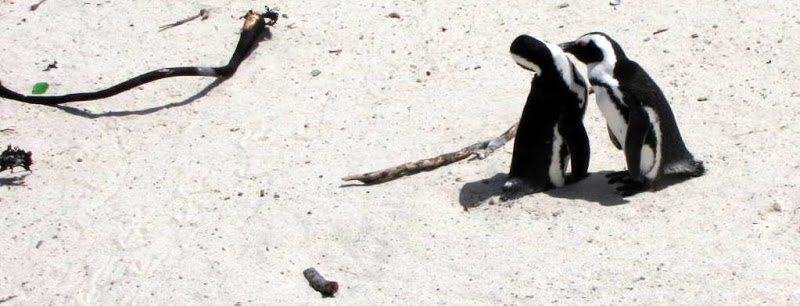
"Education is the most powerful weapon which you can use to change the world." Nelson Mandela
The desire for equality must never exceed the demands of knowledge
The desire for equality must never exceed the demands of knowledge
- nan
- Posts: 26311
- Joined: Thu May 31, 2012 9:41 pm
- Country: Switzerland
- Location: Central Europe
- Contact:
Re: Boulders Beach - Penguins, other birds etc.
I've got some too... but not too much time
Kgalagadi lover… for ever
https://safrounet.piwigo.com/
https://safrounet.piwigo.com/


